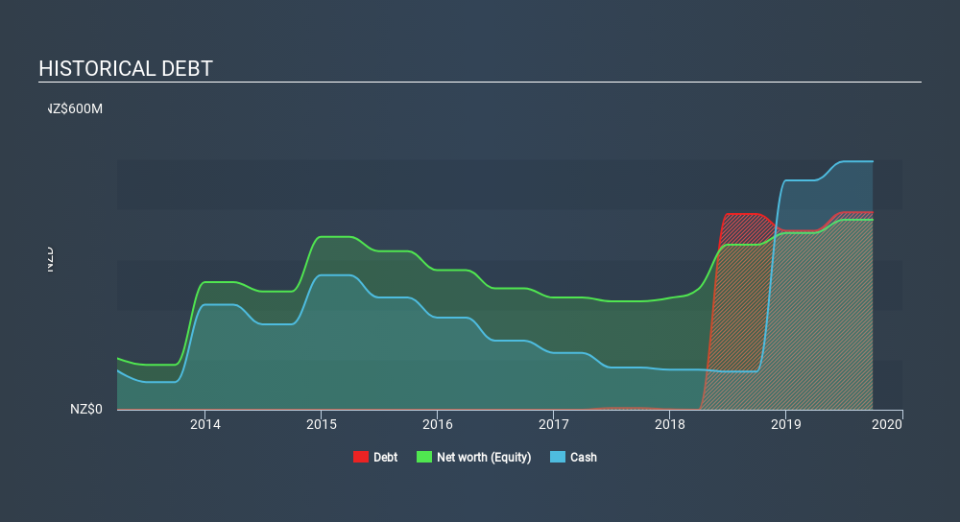Is Xero (ASX:XRO) A Risky Investment?

The external fund manager backed by Berkshire Hathaway's Charlie Munger, Li Lu, makes no bones about it when he says 'The biggest investment risk is not the volatility of prices, but whether you will suffer a permanent loss of capital. So it might be obvious that you need to consider debt, when you think about how risky any given stock is, because too much debt can sink a company. As with many other companies Xero Limited (ASX:XRO) makes use of debt. But is this debt a concern to shareholders?
Why Does Debt Bring Risk?
Debt and other liabilities become risky for a business when it cannot easily fulfill those obligations, either with free cash flow or by raising capital at an attractive price. Ultimately, if the company can't fulfill its legal obligations to repay debt, shareholders could walk away with nothing. However, a more common (but still painful) scenario is that it has to raise new equity capital at a low price, thus permanently diluting shareholders. Of course, the upside of debt is that it often represents cheap capital, especially when it replaces dilution in a company with the ability to reinvest at high rates of return. The first step when considering a company's debt levels is to consider its cash and debt together.
View our latest analysis for Xero
What Is Xero's Debt?
As you can see below, at the end of September 2019, Xero had NZ$394.6m of debt, up from NZ$391 a year ago. Click the image for more detail. However, its balance sheet shows it holds NZ$496.0m in cash, so it actually has NZ$101.4m net cash.
How Healthy Is Xero's Balance Sheet?
According to the last reported balance sheet, Xero had liabilities of NZ$115.4m due within 12 months, and liabilities of NZ$564.9m due beyond 12 months. Offsetting these obligations, it had cash of NZ$496.0m as well as receivables valued at NZ$55.4m due within 12 months. So it has liabilities totalling NZ$128.9m more than its cash and near-term receivables, combined.
This state of affairs indicates that Xero's balance sheet looks quite solid, as its total liabilities are just about equal to its liquid assets. So it's very unlikely that the NZ$11.7b company is short on cash, but still worth keeping an eye on the balance sheet. While it does have liabilities worth noting, Xero also has more cash than debt, so we're pretty confident it can manage its debt safely.
We also note that Xero improved its EBIT from a last year's loss to a positive NZ$32m. The balance sheet is clearly the area to focus on when you are analysing debt. But ultimately the future profitability of the business will decide if Xero can strengthen its balance sheet over time. So if you want to see what the professionals think, you might find this free report on analyst profit forecasts to be interesting.
Finally, while the tax-man may adore accounting profits, lenders only accept cold hard cash. While Xero has net cash on its balance sheet, it's still worth taking a look at its ability to convert earnings before interest and tax (EBIT) to free cash flow, to help us understand how quickly it is building (or eroding) that cash balance. Over the most recent year, Xero recorded free cash flow worth 62% of its EBIT, which is around normal, given free cash flow excludes interest and tax. This cold hard cash means it can reduce its debt when it wants to.
Summing up
We could understand if investors are concerned about Xero's liabilities, but we can be reassured by the fact it has has net cash of NZ$101.4m. So we don't have any problem with Xero's use of debt. We'd be motivated to research the stock further if we found out that Xero insiders have bought shares recently. If you would too, then you're in luck, since today we're sharing our list of reported insider transactions for free.
If, after all that, you're more interested in a fast growing company with a rock-solid balance sheet, then check out our list of net cash growth stocks without delay.
If you spot an error that warrants correction, please contact the editor at editorial-team@simplywallst.com. This article by Simply Wall St is general in nature. It does not constitute a recommendation to buy or sell any stock, and does not take account of your objectives, or your financial situation. Simply Wall St has no position in the stocks mentioned.
We aim to bring you long-term focused research analysis driven by fundamental data. Note that our analysis may not factor in the latest price-sensitive company announcements or qualitative material. Thank you for reading.

 Yahoo Finance
Yahoo Finance 
